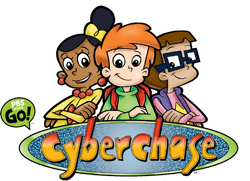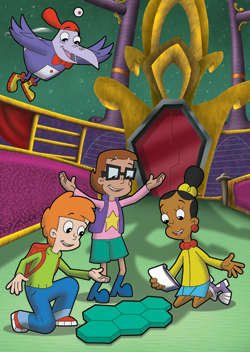Filed Under > Research/Publications
Teachers College and WNET to Research and Develop Mobile Games Based on Children's Math Series Cyberchase to Teach Fractions to Kids
Project funded by the National Science Foundation will test whether embodied cognition and narrative can improve learning of a key math skill
Project funded by the National Science Foundation will test whether embodied cognition and narrative can improve learning of a key math skill
Teachers College and WNET, New York's flagship public media provider, have received a two-year grant from the National Science Foundation to develop prototypical mobile games to teach fractions to children ages 8-11 years old. The mobile apps will incorporate the stories, characters, math content and research of Cyberchase, WNET's Emmy Award-winning math television series and multimedia project, into Teacher College's research on embodied cognition theory and gesture-based simulation games. Initially the apps will be used in related studies focusing on how children learn from new technologies. Ultimately, they may become publicly available for download.
John Black, Cleveland A. Dodge Professor of Telecommunications and Education at Teachers College and Director of TC's Institute of Learning Technologies, will serve as Principal Investigator for the project, together with two Co-Principal Investigators: Sandra Sheppard, Director of Children's and Educational Media at WNET, who is also the Executie Producer of Cyberchase; and Frances Nankin, an award-winning editor, writer and television/Web producer, formerly Executive Producer/Editorial Director for Cyberchase.
A Teachers College doctoral student, Michael Swart, will lead a team of TC students and consultants in app development and field testing in collaboration with WNET.
The project -- known as "M3," for Mobile, Movement and Math -- will test fraction-based mobile game prototypes with third, fourth and fifth-graders in TC's Harlem Ivy after school program, which includes a high proportion of under-performing students from low-income and minority backgrounds.
"Fractions are a key gateway skill in mathematics, but kids tend to see them as an abstracted concept and have difficulty mastering them," says Black. "We think that through embodied cognitive experiences, such as moving their fingers on smart phones and tablet screens, and using familiar characters, they can gain a much deeper understanding of, and feel for, fractions."
"As kids immerse themselves more in media across screens, we need to keep exploring ways that new technologies can better promote learning," says Sheppard. "We're thrilled to be partnering with Teachers College to investigate how gesture-based mobile games can enhance learning, understanding, motivation, and attitudes about math, a subject area that's critical to the long-term learning of our target audience of children in grades 3-5, and their interest and success in STEM fields."
The theory of embodied (or grounded) cognition holds that full understanding depends to a large degree on the learner's ability to create a mental perceptual simulation of what they are learning. Studies have shown, for example, that for children reading a story about farming, manipulating actual farm objects then imagining doing that leads to better retention of the story.
As digital technology has become more sophisticated, it has provided increasingly powerful forms of grounded cognition. The generally accepted hierarchy of effectiveness, from least to most, is watch, do, feel, move. That is: Watching a simulation is great, but becoming a participant by actually feeling or performing the activity in question reinforces underlying concepts.
The Teachers College/WNET project will augment that hypothesis by comparing groups of students who receive different interventions, including one in which there are no storylines.
"We think having a story will give kids more of a sense of what they're learning about," Black says.
The grant is being issued as part of NSF's new Cyberlearning program. In an initial two-year exploratory phase, the mobile games will be developed and their use intensively studied in a small group of children, in addition to a less intensive quantitative look at a larger group, both in the Harlem Ivy program. This project will generate publications in peer-reviewed journals on the learning process that takes place in the embodied learning environments observed during the research.
"The real deliverable here is the science involved, and whether or not it forms a basis for effective teaching and learning," Black says.
Produced by THIRTEEN for WNET and funded by the National Science Foundation, Cyberchase delivers positive messages about math by teaching concepts in a fun way that kids ages 8-11 can understand. In the world of Cyberchase, the dastardly villain Hacker is on a mad mission to overthrow Motherboard and take over Cyberspace with the help of his blundering henchbots, Buzz and Delete. But Motherboard enlists the help of three curious kids, Inez, Jackie, and Matt, and their cyberpal, Digit, to stop him. The TV series airs on PBS KIDS across the country. Dynamic web games, mobile games and print activities continue the learning across platforms.
In 2012, WNET-- the parent company of THIRTEEN and WLIW21 and operator of NJTV -- is celebrating the 50th Anniversary of THIRTEEN, New York's flagship public media provider.
Education Week's "Digital Education" blog covered the project: Project Envisions Teaching Fractions by Touch, Movement
Published Wednesday, Nov. 28, 2012





